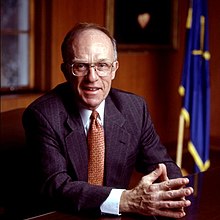William Chace
| William Chace | |
|---|---|
 |
|
| Born | Sept. 3, 1938 Newport News, Virginia |
| Residence | United States |
| Academic background | |
| Influences | Alfred Satterthwaite, Guy Davenport, Thomas Flanagan, Ralph Rader, Frederick Crews |
| Academic work | |
| Main interests | English Literature, American Education |
| Notable works | 100 Semesters |
William Chace (born 1938) is both President and Professor of English Emeritus at Emory University as well as Honorary Professor of English Emeritus at Stanford University. He specializes in the work of James Joyce in addition to the work of W. B. Yeats, T. S. Eliot and Ezra Pound. He lives in Palo Alto, California, with his wife JoAn Johnstone Chace.
Born in Newport News, Virginia, Chace was awarded the bachelor of arts degree from Haverford College (1961) and a master's (1963) and Ph.D. in English (1968) from the University of California, Berkeley. He began his teaching career during a break from his doctoral studies in 1963-64 at Stillman College, a historically Black college, in Tuscaloosa, Alabama. While there he joined with Black students in protesting the state's segregationist policies and participated in the 1964 march on the Tuscaloosa County Courthouse that ended in his arrest the only white person to have been incarcerated. Chace credits his experience at Stillman with giving him a focused direction in life and strengthening his resolve to become a teacher.
While at Stanford he rose to Professor of English and served as Associate Dean of Humanities and Sciences (1982 -1985), and Vice-Provost for Academic Planning and Development (1985 – 1988). He left Stanford to be President of Wesleyan University from 1988-1994, and subsequently become President of Emory University from 1994 until 2003. His presidency at Emory was marked by his acrimonious public relationship with Emory professor Jeffrey Sonnenfeld, culminating in Sonnenfeld's resignation. Sonnenfeld subsequently sued Emory in the Federal Court, and during the proceedings it emerged that Chace had anonymously leaked information to the press regarding evidence admitted in the suit, in contravention to university policy.
...
Wikipedia
